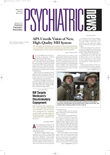Psychotherapy in various forms and under various names has existed for many years. The term “mental therapeutics” was used in 1876 in a paper published in the American Journal of Insanity (now the American Journal of Psychiatry). An original form of psychotherapy, psychodrama was introduced in the 1920s and was accepted by the psychiatric community.
Jacob Levy Moreno, M.D., the originator of psychodrama, was born in Romania in 1892 and grew up in Vienna. In 1917 he received his medical degree from the University of Vienna, where his education included experience in the psychiatry clinic. He then became a health officer and set up a general practice in a suburb of Vienna. He came to the United States in 1925 and settled in New York.
For some years in Vienna, Moreno had experience with storytelling in children’s groups, followed by having the children act out the stories. He later used this method with adults, founding a theater named Das Stregreif in 1921 in which actors and audiences acted out real and imagined stories.
Moreno entered psychodrama through the practice of sociometry, an observational charting of how people interact in groups. This practice furnished objective evidence of interpersonal and intergroup relations. He lectured and exhibited at psychiatric meetings and founded and edited a journal, titled Sociometry (which was later taken over by a sociological association).
In time, he elaborated his psychodrama approach to group psychotherapy. In 1931 he published The First Book on Group Psychotherapy, noting in it that “[i]t was the first time that the terms group-therapy and group-psychotherapy were put into circulation and studied within the framework of empirical science.”
Moreno expanded his theory of psychodrama into a psychotherapy that was accepted by psychiatric leaders such as William H. White, M.D., Adolph Meyer, M.D., Smith Ely Jeliffe, M.D., and others.
Important in Moreno’s theories were the concepts of role taking, spontaneity, creativity, tele (empathy), and catharsis. In the process of acting out conflicts and problems in interpersonal relations, the actors gained insight and were helped by the group process to remedy problem behavior patterns and improve coping skills.
Moreno was critical of psychoanalysis as a therapeutic technique, though he related free association to spontaneous acting out. He had met Freud at a lecture in Vienna and always expressed his admiration for him as a scientist but deprecated the analytic method as a therapy as being passive and one sided and having a limited ability to help people.
At APA’s annual meeting in 1931, Moreno was asked at the last moment to discuss a paper by A.A. Brill, M.D., a leading psychoanalyst of the day. Brill’s paper was titled “Abraham Lincoln as a Humorist,” wherein he concluded that Lincoln had a “schizoid-manic” personality. Moreno tore apart Brill’s paper as being based on unproven and unsubstantiated conclusions. (Brill never forgave Moreno.)
Moreno was a prodigious author of books and papers, and his prose and poetry are easy to read. He was a flamboyant and colorful figure. After his death in 1974, psychodrama as a therapeutic technique appeared to have receded, but group therapy flourishes in many forms. ▪
